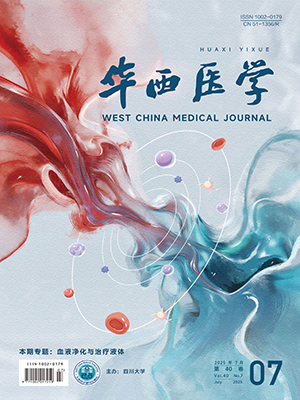| 1. |
Ouyang F, Fotuhi P, Goya M, et al. Ventricular tachycardia around the tricuspid annulus in right ventricular dysplasia[J]. Circulation, 2001, 103(6):913-914.
|
| 2. |
Seggewiss H. Medical therapy versus interventional therapy in hypertropic obstructive cardiomyopathy[J]. Curr Control Trials Cardiovasc Med, 2000, 1(2):115-119.
|
| 3. |
Dickstein K, Vardas PE, Auricchio A, et al. 2010 focused update of ESC Guidelines on device therapy in heart failure:an update of the 2008 ESC Guidelines for the diagnosis and treatment of acute and chronic heart failure and the 2007 ESC Guidelines for cardiac and resynchronization therapy. Developed with the special contribution of the Heart Failure Association and the European Heart Rhythm Association[J]. Eur J Heart Fail, 2010, 12(11):1143-1153.
|
| 4. |
徐英, 游桂英. ICD术后患者生存质量及心理状况的调查研究[J]. 成都医学院学报, 2013, 8(4):397-400.
|
| 5. |
Hardt J, Gerbershagen HU, Franke P. The symptom check-list, SCL-90-R:its use and characteristics in chronic pain patients[J]. Eur J Pain, 2000, 4(2):137-148.
|
| 6. |
Cleland JG, Daubert JC, Erdmann E, et al. The effect of cardiac resynchronization on morbidity and mortality in heart failure[J]. N Engl J Med, 2005, 352(15):1539-1549.
|
| 7. |
Bristow MR, Saxon LA, Boehmer J, et al. Cardiac-resynchronization therapy with or without an implantable defibrillator in advanced chronic heart failure[J]. N Engl J Med, 2004, 350(21):2140-2150.
|
| 8. |
敖欢, 沈贵荣, 刘翠萍. 护士心理护理知识、意识及实施现状的调查分析[J]. 青岛大学医学院学报, 2013, 49(1):62-64.
|
| 9. |
孙腾. 腹腔镜直肠癌根治术围手术期心理护理的效果[J]. 齐鲁医学杂志, 2012, 27(2):167-168.
|
| 10. |
Priest HM. Helping student nurses to identify and respond to the psychological needs of physically ill patients:implications for curriculum design[J]. Nurse Educ Today, 2006, 26(5):423-429.
|
| 11. |
周郁秋. 护理心理学[M]. 2版. 北京:人民卫生出版社, 2007:50-52.
|
| 12. |
高志凌. 浅谈心力衰竭患者的心理护理[C]//全国心脏内、外科护理学术交流暨专题讲座会议论文汇编, 北京:中华护理学会, 2008:430-431.
|
| 13. |
王海鱼, 王传家, 李复雄, 等. 充血性心力衰竭与心理评估关系[J]. 实用医技杂志, 2005, 12(5):666-667.
|
| 14. |
吕蓉, 孙路路, 安涛, 等. 心力衰竭患者生活质量与心理状态的相关性研究[J]. 护理学报, 2011, 18(2):71-73.
|
| 15. |
Danidson N, Karina W. Psychological theories of depression:potential application for the prevetion of acute coronary syndrome recurrence[J]. Psychosom Med, 2004, 66(3):165-173.
|
| 16. |
俞明辉. 老年心力衰竭患者的心理护理[J]. 赣南医学院学报, 2008, 28(1):139-140.
|




